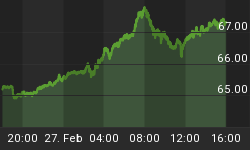Stephen Roach, former non-executive chairman of Morgan Stanley in Asia, appeared on Bloomberg TV's "In the Loop" with Betty Liu this morning, saying that he "absolutely" sees more Fed stimulus next week and that "they have no choice...the markets are setting themselves up and discounting the next QE2. They will not disappoint the markets."
Roach went on the say that "Jon Hilsenrath [of the Wall Street Journal] is actually the chairman of the Fed. When he writes something...Bernanke has no choice but to deliver on what he wrote."
He also said that QE3 is "crack" and "it's not going to work."
Roach on whether more Fed stimulus is a good idea:
"The Fed is flailing and has been flailing for the better part of the last three years. We had QE1, which worked, and that's it. We've had QE2, Twist 1, Twist 2 and now maybe QE3. The economy is in the doldrums. The biggest piece of the economy is the American consumer. 70% is in a balance sheet recession...The Fed knows this, but they are dangling this raw meat in front of the markets and the markets are salivating as they always do in that frenetic way that they try to believe in the Fed. But it has not worked and it will not work. "
On how likely it is that the Fed will issue more stimulus:
"Absolutely. They have no choice. They have gone about their usual pre-FOMC leak frenzy where they talk to this reporter and that reporter. Jon Hilsenrath is actually the chairman of the Fed. When he writes something in the Wall Street Journal, Bernanke has no choice but to deliver on what he wrote."
On whether the Fed will move on stimulus next week:
"Absolutely. They will not disappoint the markets. The markets are now setting themselves up and discounting the next QE2. The Fed has just woken up to 'oh my gosh, the economy is weak again.' Well hello! The economy has been weak for the consumer for 18 quarters. The growth rate of consumption over the last four and a half years has averaged below 1%. 70% of the economy growing below 1% and the Fed is just figuring this out? Come on."
"The point is, when they plant a story in the Wall Street Journal, and this story has been planted. Jon Hilsenrath is the weed that grows...the guy has a perfect track record...They'll do some type of QE3. Twist 2 was a huge disappointment. It was a feeble flailing at the windmill and the economy is a lot weaker than when they reached the Twist 2 decision. They'll have to do another round of quantitative easing. I don't know exactly what securities will be involved. You could speculate it could be mortgage-backs to try to help the housing market. There is some criticism they have been too focused on Treasuries. We'll have to wait and see, but I think it will definitely be another round of quantitative easing as opposed to the twisting again like we did last summer."
On whether QE3 will work:
"No, it's crack! That's what it is. It's not going to work. QE1 worked because it was in the midst of wrenching crisis. QE2 failed, despite what the Fed's research shows. Twist 1 has failed. Twist 2 is failing. When 70% of the economy is in a balance sheet recession and the growth rate for 18 quarters in row has been at less than 1% at an average annual rate, consumers are telling you something. They want to pay down debt and rebuild saving and all of the monetary stimulus in the world is not going to change what is a perfectly rational response. So the idea that the Fed is going to step in and save the day, it has not worked in the past except during the depths of the crisis and i give them credit for that. And it will not work in the future. Don't believe the Fed PR that they put out while we have research that shows that it worked. Of course they do."
On whether he expects futures to be higher than they are right now:
"The markets have responded positively to the leaks that came out late yesterday afternoon, but the response is small. I think the markets have gotten used to the fact that all of this unconventional monetary easing by the central bank is just not what it is supposed to be. In terms of delivering an actionable vigorous response in the real economy."















